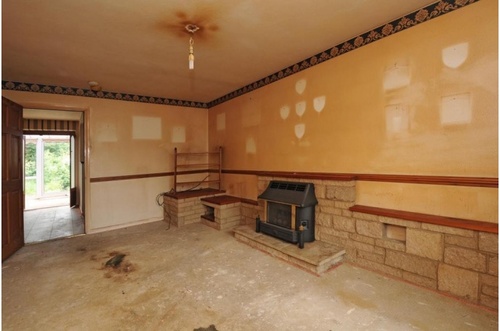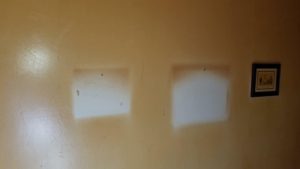Still, once a smoker moves out, will the pall of cigarette odor lift, or will it linger? Is there a way to get rid of that stench for good?
Health impacts of thirdhand smoke in a home
That smell of cigarettes long past isn’t, in fact, just a smell, it’s a residue called thirdhand smoke (THS).
The lingering odor isn’t just unpleasant; studies have also linked it to cancer. Tobacco, specific nitrosamines and nitrous acid are two of the biggest threats that cling to walls, dust, and other surfaces within a house. THS residue exposure can be especially dangerous for pets and small children, who often pick up dust and particulate matter on their hands or paws, and then put them in their mouth.
Worst of all, the effects just don’t pass.
You could breathe in several hundred nanograms of these carcinogens long after the last cigarette burned out.
Just how long afterward? In one study, researchers at San Diego State University measured thirdhand smoke pollutant levels in smokers’ homes after they’d moved out. These pollutants remained even after the homes had been cleaned and vacant for two months. True, THS levels had diminished in that time, but they were still present at higher levels than in nonsmokers’ homes.
Signs of a smoker’s house
Sellers are not required to disclose that a home has housed a smoker, so if you’re worried about it, be sure to keep an eye, and nose, out for it. A smoky smell is an obvious sign, of course, but a strong smell of Febreze, air fresheners or other fragrances could mean that the seller is trying to mask an odor. A fresh coat of paint can also mask cigarette odors, but they will eventually return.
Ask your home inspector to give you his opinion about whether someone has smoked in a house you are interested in. You are totally within your rights to ask the seller’s listing agent directly; a reputable professional should not lie about the condition of the home.
Should you buy a smoker’s house?
When you’re deciding whether to buy a smoker’s home, you should weigh not only the health risks but what’s involved in getting rid of cigarette smells. Even if you’re getting a good deal on the price of the home, it’ll take some concerted work to eliminate the odor.
How to get rid of cigarette smell in a house
Getting rid of cigarette odor isn’t easy since it seeps into everything. Cleaning can help, but replacing entire systems may be in order. Here’s what you can do to eliminate thirdhand smoke.
HVAC system
In a smoker’s house, every part of the central air system has come into contact with smoke over the years. Here are some steps you can take to rectify this:
- Clean the air ducts. Professional air duct cleaning is an effective way to eliminate odors that manifest when you turn on the furnace or AC.”
- Change the filter on your HVAC unit. Normally, you would do this every few months. If you’re trying to fight the smell of thirdhand smoke, step that up to every 30 to 45 days.
- Clean the evaporator coil. “Fumes can be pulled into the evaporator coil of an HVAC unit. The odor permeates the coil and blasts the smell of cigarettes every time you run the air conditioner.
- If nothing else fixes the problem, you may need to replace the system entirely. Of course, replacing your HVAC isn’t cheap. Expect to spend anywhere from $6,000 to $18,000, depending on your home’s size and the climate where you live.
Wash walls and ceilings
Miller recommends cleaning the walls and ceiling with a 3:1 vinegar-water mixture.
Ceilings can be the biggest culprit in a persisting smoke smell in a home since cigarette smoke tends to travel upwards and latch onto the first surface it comes in contact with.
Trisodium phosphate (TSP), a strong, general-purpose cleaning product, is also great for removing smoke smell and stains.
Change light bulbs
Smelly dust can fuse onto light bulbs as they get hot, so change them out. Windows can also retain a smoky film that emits an odor when they’re warmed by the sun, so be sure to give them a thorough washing. Blinds can also be washed with vinegar or TSP—or, better yet, throw them out.
Paint
If washing doesn’t eliminate the smell from walls and ceilings, then your next best bet is to repaint them all, first sealing in the smell with an odor-neutralizing primer like Kilz. Without the layer of primer, the smell will eventually seep back through the paint.
Clean floors and carpets
“You can sprinkle a deodorizing powder like baking soda on carpets,” says Miller. If that doesn’t work, try a professional steam clean. In the worst-case scenario, the carpets will have to be replaced.
For wood or tile, a normal cleaning with the recommended cleaner should do the trick. Be sure to vacuum up all the dust from every nook and cranny, as the dust contains the harmful (and stinky) chemicals.
Wash curtains and drapes
Fabric tends to hold onto the smoke smell, so you’ll probably need to clean all the window treatments. Depending on the fabric, some can be washed in the washing machine, while others have to be steam cleaned. You can rent a steamer, or hire a professional to take care of this for you. If cleaning doesn’t completely get the smell out, they’ll have to be replaced.
Get an air filter
Getting an indoor air filter, preferably with a HEPA filter and charcoal odor prefilter. A dehumidifier can reduce smoke smell in humid weather.




Interesting feed. Never realized that the nicotine sticks to light bulbs! Glad I’m not a smoker. Thanks for the information. Quite useful.